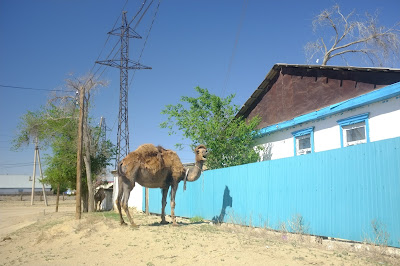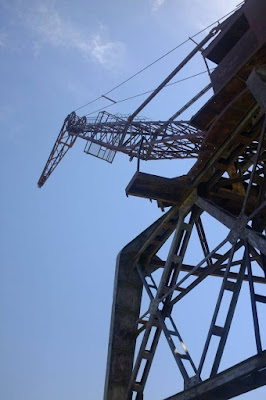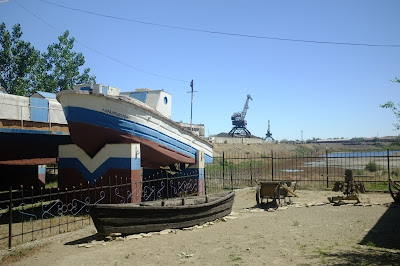The summer heat is also creeping to the green Kyrgyz hills. Our Czech families are leaving back home, and it’s time to head further east. We decided to go through Kazakhstan. The Kazakh border crossing to China seems to be a bit more hitchhikers-friendly than the one from Kyrgyzstan. At least the internet wisdom seems to say so. It still will be our hardest border and I am still on pins and needles about it. We also need to switch our passports because our visa are in our second ones.
As for Kazakhstan, last time, just a month ago, I found most of the locals grumpy and reserved. This time, we came to some other Kazakhstan. Everybody is just super friendly.
 |
| Yerlan the wrestling coach and his mum |
Ala Archa: a mountain paradise
The Swiss girls came to Kyrgyzstan and spent the last weak with my family and usd (Vojta’s mom and Jana left one week before them). My mom and my boyfriend are leaving now, and I see them to the airport – we camp in the nearby wood again. When I say goodbye to them, I travel to the mountains near Bishkek to join Vojta, Kasha and Mira.
It’s the first time on this trip I’m actually on my own. Bishkek is very near, so I’m wondering whether I should take a city bus. I don’t want to chicken out of hitchhiking just because I’m solo, though. No need – a car stops before I find a thumbing spot, and the driver offers me a ride. Even though it’s early morning, the weather is crazy hot. Downtown, I manage to get the local price for a city bus to the suburbs, which seems to be quite an achievement. I continue by hitchhiking and soon I join the others in the Ala Archa valley.
 |
| When the weather gets mad in the Issyk-kul region of Kyrgyzstan. |
The journey of the Swiss girls is over. They fly back to Europe, and Vojta and I are on our own again. We camp two more nights in a sweltering Bishkek park, spending our days in the city cafés with wifi (and air-conditioning), printing vocabularies and messages in Mandarin, and trying to figure out how to get through China. There seems to be no legal way, so we will just have to try.
 |
| In Ala Archa valley |
The more passports, the more fun
We meet once more with Amanat, the young Kazakh poet from the association that hosted us when we first came to Bishkek. He is going home, across the border to his Kazakh village, and he invites us to see his family. So we go with him.
Crossing the border is not so easy, though.
My boyfriend brought us our spare passports from Czechia, with the Chinese visa from the Czech agency in it. However, we came to Kyrgyzstan on a different passport – so each of us has a passport with the Chinese visa, and another passport with all the other stamps. We decided to switch the passports on the Kyrgyzstan-Kazakhstan border, so that we don’t have to do it when we will be crossing to China. The poor Kazakh border control doesn’t seem to be ready for this, though.
„Where is your entry stamp?“ the guard asks me when I show him my passport with nothing than the Chinese visa in it.
„In my second passport.“
He is staring at my two Czech passports, and it seems his brain is about to blow up.
„Whose is the other passport?“
„It’s mine.“
„Where did you get it?“
„From the same authority as the first one.“
„So the second one is a copy of the first one?“
„No“.
„So what’s the difference?“
„The passport number.“
The guard calls another guard, we have the very same conversation, then they call a third guard. They confiscate our passports and lead us to an office. We wait outside. It’s over 40°C and the stifling customs feel like a giant greenhouse. They also smell – not like a greenhouse, though. I ask the guards for water, but they can’t give us any. Poor Amanat is still with us, and his family calls him every few minutes. We are let in an air-conditioned office, then we are kicked off again and we keep waiting in the corridor. There also is a Georgian lady waiting, so we at least can chat about Georgian food with her. We go hold the entire passport conversation with one more officer and then go back waiting. After almost 4 hours, a plain-clothed guy with black glasses and a notebook arrives, takes us to the air conditioned office again and we go through the „why do you have 2 passports“ conversation once more. He ends up playing with our passports in his fingers, looking at us, then at the passports, then at us again.
„Propustit,“ he says finally. He closes his notebook and leaves again. We get a stamp and are free to go.
 |
| Amanat's home |
40°C and counting
We arrive to Amanat’s home way later than expected. It is a cosy village house with a garden. It reminds me of my grandma’s garden long ago back in Czechia. His mother is reserved but doesn’t seem to be mad at us much. They give us a plenty of home-made food and a drink made of fermented grains. (It is slightly sour and when I first had it in Kyrgyzstan, it tasted like vomit. I started liking it now, though.) They also have a bucket shower and a small paddling pool in the garden for Amanat’s little sisters. They let us use both. In the sultry weather, the pool seems to be the best place to be in the whole village. At evening, some of Amanat’s sisters and his father come from their trip to the Issyk-kul lake, and show us their pictures. We also talk about Amanat’s school. He made an innovative theater project focused on dispute-solving in families, was in Kyrgyz news and was even invited to run the project in Kazakhstan. He would like to get into politics after school. He admires the Kazakh president and dreams of meeting him in person. He is happy about all the opportunities there are in his country now – way more than his parents’ generation had in the Soviet times.
 |
| Our pictures from Europe seem to be interesting. |
In the morning, we get a lot of food again and we say goodbye to everybody. Amanat walks us through the blazing hot village to the main road, and we part for good.
We want to avoid Almaty and try to go around because we have very little Kazakh money and don’t want to change more. We find out, though, that we actually don’t need more if we eat what we have left from Kyrgyzstan and just buy bread. (Our budget suddenly shrinks when Vojta stops buying Coke and ice-creams.)
Our driver has an air-conditioned car but if I try to touch the window, the glass is burning hot. So I just enjoy every minute we spend in a bearable temperature. Even the driver says that a weather like this is not usual here. When we get out of the car, the heat almost knocks me down. We walk along the road to find the right way around Almaty. Every time we see a water tap, I pour water all over myself to enjoy 10 minutes before all my clothes get dry again.
 |
| A Kakazkh kitten (the picture is pretty much unrelated but I put it in here because it's cute) |
Next day, the weather is even hotter. Fortunately, the road goes through a mountain pass and we end up waiting on the very top. Here, the temperature is under 40°C, which feels almost mild, and the last car crew gave us cookies with hippos on it. I’m perfectly happy we got a bit stuck.
In a Kazakh village: barbecue, vodka and Shoqan Walikhanov
In the afternoon, we get picked up by Yerlan. He is a wrestling coach and finds the idea of hitchhiking through Kazakhstan quite fun, even though he tells us it will be hard in China because Chinese food is bad.
Yerlan first takes us to his family’s house. His parents look like characters from a fairy tale. They only speak Kazakh – no Russian. Our new friend tells us they originally came from China. His mum gives us lagman and tea and it seems like the best unexpected goodbye to Central Asia.
 |
| Yerlan's dad |
 |
| In the museum of Shoqan Walikhanov |
The place we are going to is a little mountain pond where we can swim. Yerlan’s neighbors are finishing somebody’s birthday celebration with barbecue and some bottles. An elderly man makes Vojta drink with him and every time Vojta refuses, he gets mad. They also lend us their horses to ride them around. When the party is over, a stern-looking 12 years old boy puts his tired father and uncle into their car, and drives them home. Vojta – who normally doesn’t drink at all – is drunk too.
 |
| Party at the pond |


































